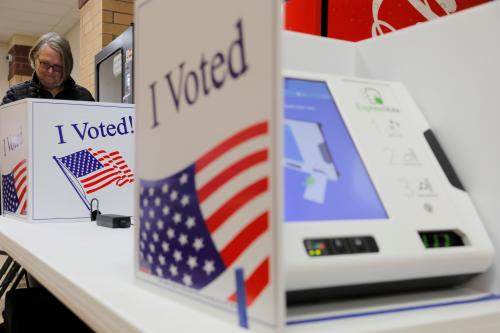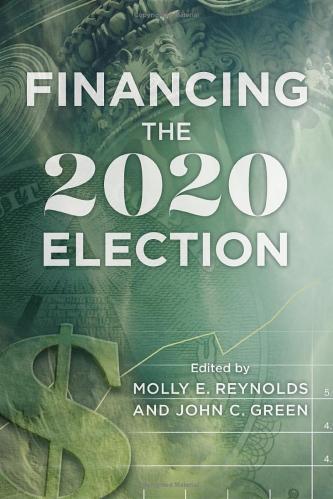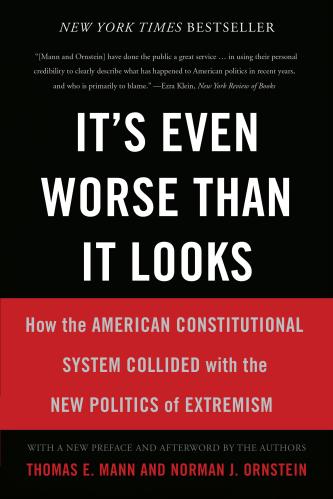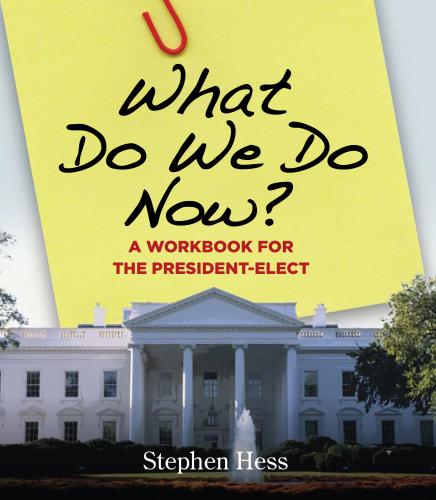Like many political observers, I was more than a little surprised when former Vice President Joe Biden’s campaign for the Democratic presidential nomination rocketed ahead of his rivals after his official announcement. Nothing suggested this would be the case—not his Hamlet-like indecisiveness about getting into the race, nor his less-than-adept handling of the slings and arrows his Democratic rivals and party activists hurled at him before he officially announced. But when I focused in on what Biden did when he finally announced, the answer came to me in a flash. It brings me back to an obscure congressional race that took place 45 years ago when I was the young chairman of the Michigan Democratic party.
Biden’s first campaign video took aim squarely at the incumbent president, making it clear the election was a “battle for the soul of this nation.” It was the same theme Democrat Richard Vander Veen used to get elected to Gerald Ford’s former congressional seat in the 1974 special election called when Ford was elevated to the vice presidency.
Back then, the district was centered in Grand Rapids, MI, a town known for its strong conservative tendencies which reflected the influence of its original Dutch Reform settlers. No Democratic Congressional candidate had carried Michigan’s fifth district since 1910. Everyone assumed the election would be a non-event with the Republican State Senator from Grand Rapids, Robert VanderLaan moving into the seat he had been waiting to inherit for much of his political career.
I’d been elected to chair the Michigan Democratic Party the year before—right about the time Joe Biden, who was born in the same week as I was, got elected to the United States Senate. Given my role, I was delighted to hear that Dick Vander Veen, who hadn’t run for political office since losing races in 1958 and 1960, was willing to take on the challenge.
When I met Vander Veen to explain the limited help the party could be to his candidacy, he confidently assured me that he was going to win the special election on the basis of a strategy designed to give the voters of Grand Rapids the chance to put their favorite son, Gerald Ford, in the White House. “I’m going to make this election a referendum on whether or not Richard Nixon should be removed from office, he told me. “I’m not going to talk about any policies or partisan differences or my opponent. I’m going to deliver just that one message. I will take votes from any person of any partisan persuasion who thinks the President is unfit for office because of the crimes he has committed while in office.”
Mind you, at this point in time (January 1974), President Nixon, although under a barrage of accusations from the Watergate “matter”, as he called it, was firmly in political control of his party and much of the electorate. So, I wished Dick Vander Veen well and told him the state party would be happy to provide whatever support he might want that we could afford to give—which wasn’t much. His campaign, under the skilled management of a young political consulting firm, Marttila, Payne, Kiley & Thorne of Boston, proceeded just as he had outlined it. Very few people, including the national press, paid much attention, other than to comment on the odd similarities in the last names of the two candidates.
On February 18, 1974, I returned to Grand Rapids to be present at that night’s “victory party,” not expecting any such thing, When I met with the candidate, who remained absolutely convinced he was about to become Congressman Vander Veen, I went out of my way to explain to him that as positive a reception as he may have been getting from voters at campaign events, it was very unlikely that those interactions represented a valid sample of overall voter sentiment in this heavily Republican district. He dismissed my warnings with a wave of his hand and told me he had to leave our breakfast meeting early so he could “shake a few more hands and make sure I win today.”
The Democratic victory party was held in a hall on the second floor of the Polish Century Club—the only such facility in Grand Rapids that would rent to a Democrat. The polls closed at 8 PM, so I was startled to hear the Democratic party chairman of the fifth district, Bob Kleiner, bounding up the stairs around 8:30 PM, shouting at the top of his lungs, “We won, we won, we won!” I told him to calm down and tell me why at this early hour he thought so. As he tried to catch his breath, Bob explained that he had been present in his precinct in E. Grand Rapids and based his enthusiasm on the vote totals that had been read off the back of the machine as soon as the polls closed. (Forty-five years ago, most Michigan cities used mechanical voting machines to record each vote and each party was allowed to have one observer as the backs of those machines were removed and the counters for each office were read out for the local clerk to tally the official results.)
I asked him what those results were and reminded him that the small wealthy suburb’s four precincts, where candidate Vander Veen also lived, was hardly representative of the district as a whole. “I know,” he said, reminding me that he had been party chairman for the district while I was still in high school. “But look, we got almost half the vote in my precinct. In all my years as party chairman, no Democrat has ever gotten more than a third of the vote.”
Bob Kleiner’s analysis proved to be prescient. In fact, when all the votes were counted, Richard Vander Veen had won the majority of the 100,000 votes cast by a 53 percent to 47 percent margin. His stunning upset made history and severely undercut President Nixon’s political standing in the Congress. He was also elected in the general election in November, joining the largest freshman Democratic class in history.
I don’t know if former Vice-President Biden remembers that campaign or not, but his campaign approach suggests he would agree with what I told Dick VanderVeen on that historic night, “Your strategy worked. Even the conservative voters of Grand Rapids don’t want a crook for their president.”
Morley Winograd is a Senior Fellow at the USC Annenberg School’s Center for Communication Leadership & Policy. He was Chairman of the Michigan Democratic Party from 1973 to 1979.
A previous version of this piece stated that Vander Veen was re-elected in 1976. He was defeated in the 1976 election.










Commentary
Why is Joe Biden running away with the Democratic presidential nomination?
May 20, 2019